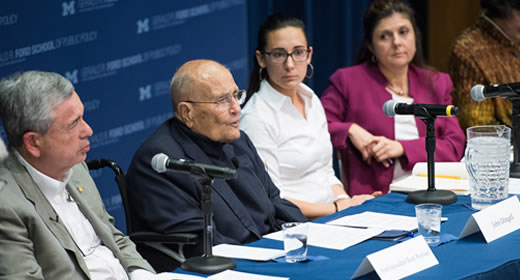
Over 600 people filled the Annenberg Auditorium, Betty Ford Classroom, Great Hall, and at least three other classrooms around the Ford School on Wednesday, November 9 to watch a panel of professors and policymakers unpack the results of the 2016 election and predict the implications of a Trump administration. Almost 450 unique viewers tuned in to watch the event via livestream.
- The event was covered by Kaela Theut for the Michigan Daily in “Panel of professors, politicians analyze election results” and by Martin Slagter for MLive in "U-M panel breaks down election results, what Trump presidency might look like."
The "2016 Decided: Post-election analysis" panel included Ronald Weiser, John D. Dingell, Jr., Mara Cecilia Ostfeld, Betsey Stevenson, and Marina v. N. Whitman. Paul Courant, professor of public policy, economics, and information, organized and moderated the event.
The panel, held the day following the 2016 presidential election, was particularly meaningful and relevant given the fact that Donald Trump’s victory took so many forecasters by surprise; many in the audience had believed Hillary Clinton would win. Many public policy students, still coming to terms with the unanticipated outcome, attended the panel to understand why the election results were so different than predicted and where the country would be headed under a Trump administration.
Ronald Weiser, former U.S. Ambassador to Slovakia and a newly-elected member of the U-M Board of Regents, began by saying he was as shocked as everyone else in the room about the outcome of the election. While he had not supported Trump in the primary, Weiser assisted with fundraising after Trump won the Republican party nomination. He shared his belief that anger about elitism and the influence of special interests in politics fueled Trump’s win.
Many of the other panelists threaded the needle between cautious optimism and concern. Former congressman John D. Dingell said we would ultimately have to wait for more statements, such as the inauguration speech, to understand President Trump’s policy priorities. He expressed his hope that the next administration would encourage unity instead of division, adding that we should all be able to “work together for the greater good of the nation that has been so good and has meant so much to all of us in terms of privileges and rights and freedoms.”
Political scientist and elections analyst Mara Ostfield, who had not slept, confessed that she was “still trying to figure out what happened.” In analyzing exit polls for NBC and Telemundo the previous night, she had expected certain social groups to turn out in much higher numbers for Clinton. Instead, she said, white male voters came out in full force to back Trump.
Betsey Stevenson, an associate professor of public policy and economics and a former member of President Obama’s Council of Economic Advisers, thought that the election results were not based on public policy. Instead, Stevenson said, people were voting because they were frustrated about the rapid rate of change under the Obama Administration.
Sweeping partisan legislation, such as the Affordable Care Act, mixed with stagnating wages, resulted in a lot of anger, she said. Stevenson mentioned her hopes for a Trump administration, including that President-elect Trump would be willing to work on issues like infrastructure spending: “If he can get that done, that would be great for the U.S.”
Marina v. N. Whitman, professor of business administration and public policy and a one-time member of President Nixon’s Council of Economic Advisers, was more pessimistic, especially when viewing the election through the lens of international economics.
While there is a lot we don’t know about Trump’s policy plans, she said, he has been consistent for years in his opposition to trade liberalization. Whitman explained why economists disagree with Trump’s view that the U.S. “loses” in trade agreements. While we have not done enough to help those individuals who have been negatively impacted by trade, Whitman said, our country benefits as a whole.
Panel members then speculated on how the new administration would impact a range of policy issues such as the Trans-Pacific Partnership, the national budget, the Affordable Care Act, immigration, and more. Students and community members asked questions about a variety of topics, including what motivated voter turnout, the disparity between the Electoral College and popular vote, economic fears, and how students on campus who are “living on the margin” can feel safe given some of Trump’s rhetoric during the campaign.
As the Ford School community continues to parse the implications of the election, Dean Susan Collins assured students that their work was more needed than ever.
“There are a lot of really intense emotions in the building that people are dealing with in a variety of ways....But I can also say without any hesitation that I believe very strongly in our mission as a school of public policy and the education we provide. I believe that the role of well-done social science is critical in public decision-making, and I’m really confident that the work that we do here is relevant and in fact is essential. We need all of you and all of the work that you’re doing and every ounce of smarts and energy and passion that you can give this nation and our world.”
Watch the video of the panel here. To see more photos of the event, visit the Ford School's Flickr album here.
-- Story by Jacqueline Mullen (MPP '18)
